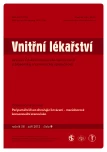Warning about risk of invasive infections in splenectomized patients. Experiences from University Hospital Brno, Czech Republic, in 2011
Authors:
P. Polák 1; M. Freibergerová 1; P. Husa 1; P. Šlesinger 1; R. Svoboda 1; J. Stašek 2; L. Frola 3; C. Macháček 3
Authors‘ workplace:
Klinika infekčních chorob Lékařské fakulty MU a FN Brno, pracoviště Bohunice, přednosta prof. MUDr. Petr Husa, CSc.
1; Klinika anesteziologie, resuscitace a intenzivní medicíny Lékařské fakulty MU a FN Brno, pracoviště Bohunice, přednosta prof. MUDr. Pavel Ševčík, CSc.
2; Ústav patologie Lékařské fakulty MU a FN Brno, pracoviště Bohunice, přednosta doc. MUDr. Josef Feit, CSc.
3
Published in:
Vnitř Lék 2012; 58(9): 665-667
Category:
Case Reports
Overview
Syndrome of fulminant sepsis in splenectomized (overwhelming postsplenectomy infection – OPSI) is feared and often fatal infectious complication in patients after splenectomy. The risk of syndrome of fulminant sepsis in splenectomized in these persons persists lifelong and doesn’t diminish during the time. Etiologically, encapsulated bacterias like Streptococcus pneumoniae, Haemophilus influenzae group b and Neisseria meningitidis are involved. As the mortality of syndrome of fulminant sepsis in splenectomized is very high, it is indispensable to educate and vaccinate persons in risk. The authors present case reports of three splenectomized patients who were hospitalized for invasive pneumococcal infection in the University Hospital Brno, Czech Republic, in 2011.
Key words:
splenectomy – OPSI syndrome – vaccination – pneumococcus
Sources
1. Cameron PU, Jones P, Gorniak M et al. Splenectomy associated changes in IgM memory B cells in an adult spleen registry cohort. PLoS One 2011; 6: e23164.
2. de Porto AP, Lammers AJ, Bennink RJ et al. Assessment of splenic function. Eur J Clin Microbiol Infect Dis 2010; 29 : 1465–1473.
3. Shumacker HB, King H. Splenic studies. AMA Arch Surg 1952; 65 : 499–510.
4. Coignard-Biehler H, Lanternier F, de Montalembert M et al. Infections in splenectomized patient. Rev Prat 2008; 58 : 2209–2214.
5. Hasse B, Moll C, Oehy K et al. Anti-infectious prophylaxis after splenectomy: current practice in an eastern region of Switzerland. Swiss Med Wkly 2005; 135 : 291–296.
6. Lammers AJ, Veninga D, Lombarts MJ et al. Management of post-splenectomy patients in the Netherlands. Eur J Clin Microbiol Infect Dis 2010; 29 : 399–405.
7. Gruntová I, Janoušek S, Pařízková R et al. Naše zkušenosti s prevencí infekcí u pacientů po splenektomii. Klin Mikrobiol Inf Lek 2005; 11 : 51–55.
8. Ráčil Z. Infekční komplikace a jejich prevence u dospělých pacientů s funkčním hyposplenismem a po splenektomii. Postgrad Med 2004; 6 : 7–15.
9. Polák P, Šlesinger P, Pařízková R et al. Asplenický pacient: odpovědnost nás všech. Prakt Lek 2010; 90 : 396–397.
10. Wilkes A, Wills V, Smith S. Patient knowledge of the risks of post-splenectomy sepsis. ANZ J Surg 2008; 78 : 867–870.
11. Coignard-Biehler H, Lanternier F, Hot A et al. Adherence to preventive measures after splenectomy in the hospital setting and in the community. J Infect Public Health 2001; 4 : 187–194.
12. Di Sabatino A, Carsetti R, Corazza GR. Post-splenectomy and hyposplenic states. Lancet 2011; 378 : 86–97.
13. Ráčil Z. Prevence septických stavů u dospělých pacientů s funkčním hyposplenismem a po splenektomii. Vnitř Lék 2001; 47 : 781–789.
14. Harji DP, Jaunoo SS, Mistry P et al. Immunoprophylaxis in asplenic patients. Int J Surg 2009; 7 : 421–423.
15. Dvořáková A, Maďar R. Prevence pneumokokových infekcí u dospělých osob. Ockov Cest Med 2010; 1 : 18–19.
16. Kaplinsky C, Spirer Z. Post-splenectomy antibiotic prophylaxis – unfinished story: to treat or not to treat? Pediatr Blood Cancer 2006; 47 (Suppl 5): 740–741.
17. Jones P, Leder K, Woolley I et al. Postsplenectomy infection – strategies for prevention in general practice. Aust Fam Physician 2010; 39 : 383–386.
18. Svoboda R. Nakupení úmrtí postsplenektomovaných osob a možná prevence. Bulletin Sdružení praktických lékařů ČR 2011; 4.
Labels
Diabetology Endocrinology Internal medicineArticle was published in
Internal Medicine

2012 Issue 9
-
All articles in this issue
- A comparison of two methods of long-term external ECG telemonitoring in patients after ablation for atrial fibrillation
- Regular exercise training decreases asymmetric dimethylarginine after kidney transplantation
- Superficial thrombophlebitis, unjustly underestimated disease – has the time come to change our view?
- Drug compliance – a pitfall of therapy of rheumatoid arthritis?
- Peripartal life-threatening hemorrhage – interdisciplinary consensus opinion
- Warning about risk of invasive infections in splenectomized patients. Experiences from University Hospital Brno, Czech Republic, in 2011
- Morbus Weil – a case study and principles
- Heart tumor manifesting as a sudden cardiac death
- Our experience in treatment of multicentric plasma-cell Castleman disease associated with vasculitis manifestations – case report and literature review
- Hyperventilation echocardiography in spastic angina pectoris diagnosing
- Internal Medicine
- Journal archive
- Current issue
- Online only
- About the journal
Most read in this issue
- Superficial thrombophlebitis, unjustly underestimated disease – has the time come to change our view?
- Warning about risk of invasive infections in splenectomized patients. Experiences from University Hospital Brno, Czech Republic, in 2011
- Morbus Weil – a case study and principles
- Hyperventilation echocardiography in spastic angina pectoris diagnosing
